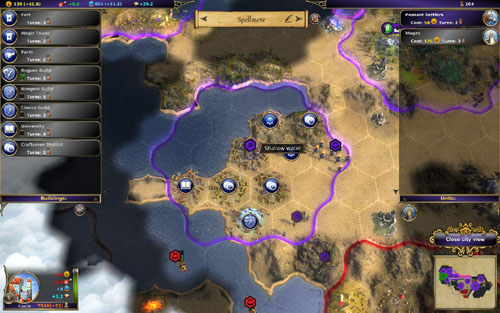Beyond Co-Op Review: Warlock - Master of the Arcane

I’ve played my fair share of strategy and real-time strategy titles over the years. As a serious PC gamer, it’s pretty hard not to get hooked on at least a couple. Though I’ve not personally played any of the Civilization games, I’ve watched others play them, viewed videos about them, and talked to Civ players about them. With that being said, I think a good way to describe Warlock - Master of the Arcane is a healthy mix between Civilization and Heroes of Might and Magic.
Upon first glance, it might be easy to mistake Warlock for a Civ V clone in a fantasy setting. It’s a turn-based, city-building game with a map spread over a hex-based grid. There’s a whole world of difference going on under the surface, however. Warlock places its greatest emphasis on the combat. While your cities are important, they mostly serve as bases to pump out units. Sure, you don’t want anyone messing with your city (as that would hurt your ability to recruit those powerful units you spent 3 buildings and 20 turns to gain access to!), but your main concern is to sally forth and kill enemy monsters and mages. This allows you to level up your units and make them stronger.

One aspect of Warlock that strongly reminded me of Heroes of Might and Magic is that your ruler (or Mage) has the ability to learn and cast spells. The way you learn spells is loosely reminiscent of a Civ tech tree. On a separate turn timer than raising new buildings or recruiting new units, the spell research system allows you to constantly learn new spells. You always get an option between 5 potential spells to learn, and once a spell is learned, the interface will replace the most recently learned spell with a new one. Spells certainly aren’t free, however, and take a mana resource to cast. Some also have a cast time where you’ll have to charge up a spell over a turn or two before you can cast it. So in addition to having your units attack enemy units and siege cities, your disembodied mage can sling spells without fear of personal bodily harm. Some of these spells even summon new permanent units, which is certainly exciting.
Despite having quite a robust combat system, some strategy fans may find the diplomacy lacking. Upon discovering a new mage, you can elect to open a diplomacy window and choose between a few options such as creating a peace treaty, declaring war, or flat-out bribery with resources. I’ve heard how intense the diplomacy and politicking in Civilization is, and I can assure you that Warlock does not have anything so deep. The AI mages often seem to have no strategy at all beyond self-preservation, and once a certain point is reached in a game, they will often declare war on you for no apparent reason. There is certainly no world peace victory condition in Warlock; it’s complete eat or be eaten. In my opinion, though, this is completely fine as Warlock does not appear interested in creating a deep political system. Annihilate all enemies is certainly fine by me, as the combat is engaging.
As is the case of many turn-based strategy games, it’s likely that this all sounds pretty dry on paper. Let me tell you, though, that whenever I fired up this game, I was struck by that one-more-turn-itis as I vowed I would stop playing as soon as I finished sieging this city. But then there was always another reason I had to keep going. Warlock certainly isn’t perfect, and has a little bit of the rough-around-the-edges charm, but it’s a fun spin of turn-based strategy for a mere $20.